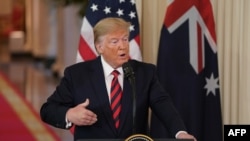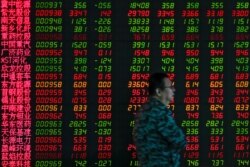Jie Xi from Mandarin service contributed to this report
WASHINGTON - U.S. President Donald Trump said on Friday that he wants a complete trade deal with China and that the country's purchase of American agricultural goods is not enough. He made the comments ahead of the next round of senior level U.S.-China trade talks in Washington.
"We're looking for a complete deal. I'm not looking for a partial deal. China has been starting to buy our agricultural product, if you noticed over the last week, and actually some very big purchases. But that's not what I'm looking for. We're looking for the big deal," said Trump during a joint press conference with visiting Australian Prime Minister Scott Morrison at the White House.
Washington and Beijing last held major talks in July, but there was no major breakthrough in the trade disputes between the world's top two economies.
The two countries have been engaged in a series of escalating tit-for-tat tariffs for more than a year, sparked by the U.S.'s initial demand for changes in China's trade, subsidy and intellectual property practices.
Beijing says Washington's trade policies are aimed at trying to stifle its ability to compete.
As the U.S. continues to impose tariffs on Chinese goods, Trump said Friday China is experiencing "the worst" economy in years.
"Two weeks ago it's the worst in 22 years, now it's 57 years and it's only going to get worse," said Trump.
While government economists in Beijing are slightly more optimistic, as they expect a stimulus plan to help stave off a sharper slowdown, some American analysts said China's economic growth risks slipping below the lower-end of Beijing's 2019 target of 6% in the third quarter or over the next year.
Brad Setser from Council on Foreign Relations says the economic stimulus measures provided by the Chinese government have "been too modest to push China's growth back up."
"The hits to confidence and uncertainty have been important in dampening the outlook in China. Even firms that are not planning to leave in the short term are exploring alternatives more seriously than in the past, rather than relying on one country for their production or supplies," said Martin Chorzempa from the Peterson Institute for International Economics.





